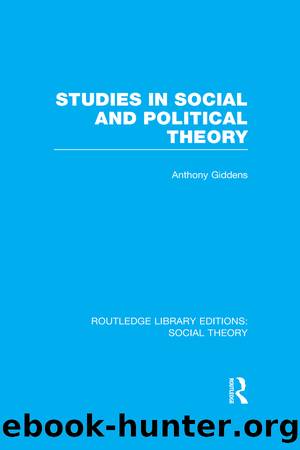Studies in Social and Political Theory (RLE Social Theory) by Anthony Giddens

Author:Anthony Giddens [Giddens, Anthony]
Language: eng
Format: epub
Tags: Social Science, Sociology, General
ISBN: 9781317650645
Google: 3_pTBAAAQBAJ
Publisher: Routledge
Published: 2014-08-21T05:00:57+00:00
Marx and Weber: problems of class structure
Over recent years, there has grown up a tradition of scholarship, particularly among American authors, which treats the writings of Max Weber on issues of class structure, class conflict and capitalism as âextensionsâ or âelaborationsâ of Marxâs views on these matters. Perhaps the origin of this standpoint is to be found in Gerth and Millsâs introduction to what was, and probably remains, the most widely used selection of translations from the spectrum of Weberâs works. âMuch of Weberâs workâ, they say, is âinformed by a skilful application of Marxâs historical methodâ; and they continue: âPart of Weberâs own work may be thus seen as an attempt to âround outâ Marxâs economic materialism by a political and military materialism.â83 The intellectual relation between Marx and Weber is a matter of some complexity since, as has just been indicated, Weberâs proximate polemical targets were often the leading Marxists of his time, whose versions of Marxism were mainly of a âmechanicalâ kind. But there are clear conceptual continuities between Marx and Weber in the latterâs use of the terms âclassâ, âclass conflictâ and âcapitalismâ,84 and it is important to recognize that such terminological similarities readily may serve to gloss over what are perhaps the most deep-lying divergencies between the two thinkers.
Weberâs specific use of âclassâ connects both with his characterization of âcapitalismâ as a type of socio-economic organization, and more generally as the modern Western form of society and culture, on the one hand, and with the emphases of his methodological writings on the other; all of these decisively separate his views from those of Marx. It is commonly accepted that Weberâs famous threefold differentation of class, status and party is in some part directed polemically against what Weber saw as Marxâs tendency to reduce too much of history to the history of class struggles. âStatus groupsâ (Stände) play a major role in history, and are not based directly upon economic relations as classes are; and in recognizing the third mode of organization linked to the promotion of interests, the formation of parties in the modern polity, Weber gives conceptual recognition to his theme that politics is not merely, or even perhaps primarily, an expression of class divisions. But it is not these factors alone that set Weberâs analysis off from that of Marx: the more basic differences centre upon the notions of âclassâ and âclass conflictâ themselves.
Weber, like Marx, accepts that â âpropertyâ and âlack of propertyâ are ⦠the basic categories of all class situationsâ;85 and his typology of âownershipâ and âacquisition classesâ is based upon such a categorization. But most of the weight in Weberâs discussion is placed upon the advantages that can be mobilized in market relations by the possession of particular types of property â combined with the stress that the kinds of services that can be offered on the market also provide for the differential mobilization of market advantages among the propertyless. For Weber, âclassâ is thus distinctively associated with the
Download
This site does not store any files on its server. We only index and link to content provided by other sites. Please contact the content providers to delete copyright contents if any and email us, we'll remove relevant links or contents immediately.
| Grief & Bereavement | Hospice Care |
| Pet Loss | Suicide |
They Both Die at the End by Adam Silvera(9807)
Thirteen Reasons Why by Jay Asher(8893)
The Space Between by Michelle L. Teichman(6929)
Suicide Notes by Michael Thomas Ford(4821)
Tuesdays with Morrie by Mitch Albom(4770)
Suicide: A Study in Sociology by Emile Durkheim(3018)
The Checklist Manifesto by Atul Gawande(2847)
Tuesdays With Morrie by Mitch Albom(2754)
In the Woods by Tana French(2587)
Bossypants by Tina Fey(2525)
Robin by Dave Itzkoff(2437)
Olive Kitteridge by Elizabeth Strout(2366)
No Ashes in the Fire by Darnell L Moore(2329)
Reservoir 13 by Jon McGregor(2300)
End of Days by Sylvia Browne(2176)
All Things New by John Eldredge(2159)
Bus on Jaffa Road by Mike Kelly(2150)
Scar Tissue by Anthony Kiedis(2130)
No Time to Say Goodbye(2112)
